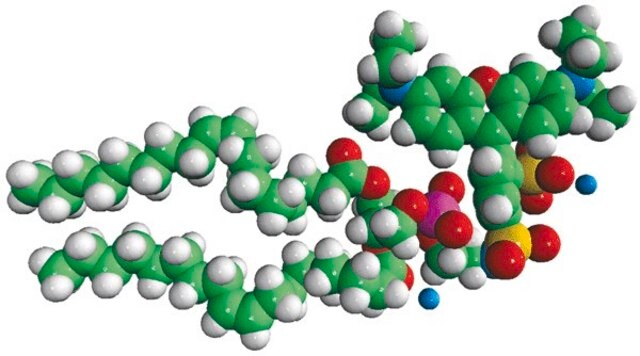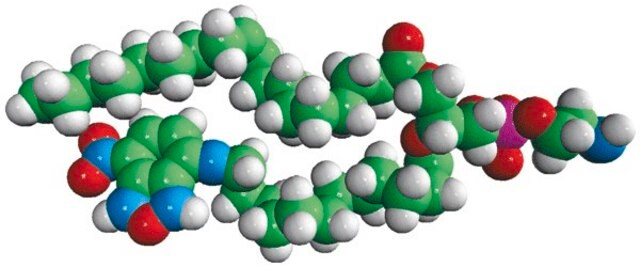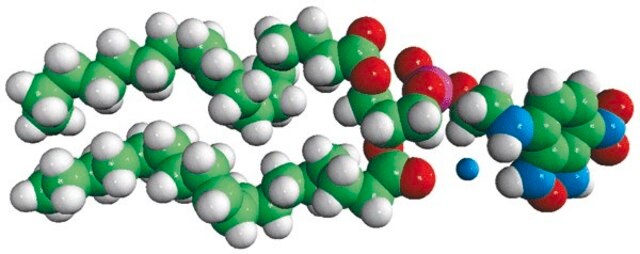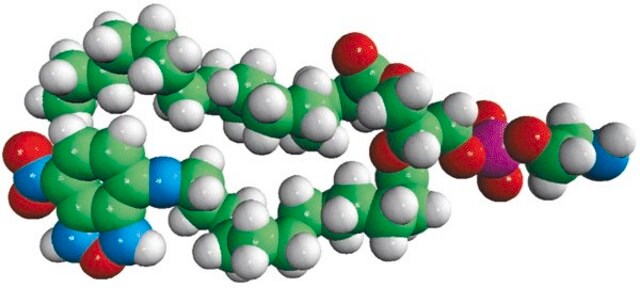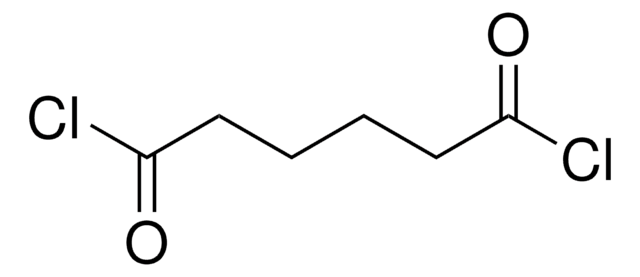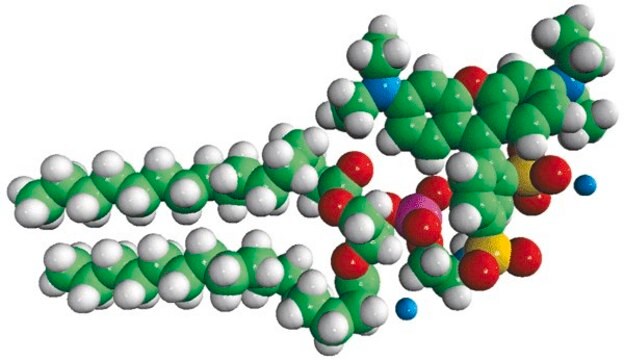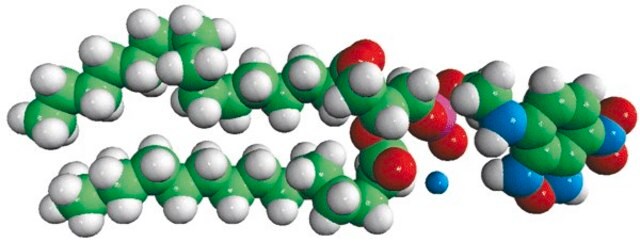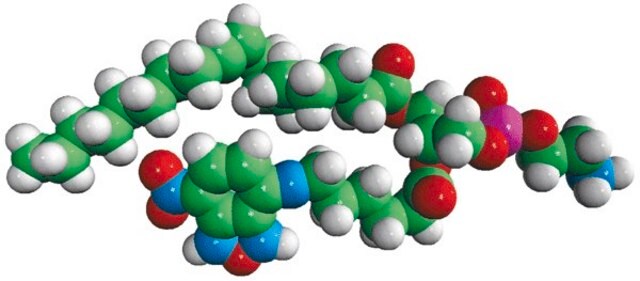810156P
Avanti
18:1-12:0 NBD PE
Avanti Research™ - A Croda Brand 810156P, powder
Synonim(y):
1-oleoyl-2-{12-[(7-nitro-2-1,3-benzoxadiazol-4-yl)amino]dodecanoyl}-sn-glycero-3-phosphoethanolamine
Zaloguj sięWyświetlanie cen organizacyjnych i kontraktowych
About This Item
Wzór empiryczny (zapis Hilla):
C41H70N5O11P
Numer CAS:
Masa cząsteczkowa:
840.00
Kod UNSPSC:
12352211
NACRES:
NA.25
Polecane produkty
Próba
>99% (TLC)
Postać
powder
opakowanie
pkg of 1 × 1 mg (810156P-1mg)
producent / nazwa handlowa
Avanti Research™ - A Croda Brand 810156P
Warunki transportu
dry ice
temp. przechowywania
−20°C
Opis ogólny
N-(7-nitrobenz-2-oxa-1,3-diazol-4-yl) phosphoethanolamine (NBD PE) is a fluorescently labeled lipid where NBD is attached to the headgroup of phosphatidylethanolamine (PE). PE is an aminophospholipid abundant in brain.
Zastosowanie
18:1-06:0 NBD PE or 1-oleoyl-2-{12-[(7-nitro-2-1,3-benzoxadiazol-4-yl)amino]dodecanoyl}-sn-glycero-3-phosphoethanolamine may be used as a component of liposome in cross-linking experiment and to determine M13 protein coat towards phospholipids.
Działania biochem./fizjol.
N-(7-nitrobenz-2-oxa-1,3-diazol-4-yl) phosphoethanolamine (NBD PE) plays a key role as a fluorescent analog in the studies of organization and dynamics of membranes. NBD PE contributes to monitoring Red edge excitation shift (REES) effects, with the unique motional and dielectric properties it possesses.
Opakowanie
5 mL Amber Glass Screw Cap Vial (810156P-1mg)
Informacje prawne
Avanti Research is a trademark of Avanti Polar Lipids, LLC
This page may contain text that has been machine translated.
Kod klasy składowania
11 - Combustible Solids
Certyfikaty analizy (CoA)
Poszukaj Certyfikaty analizy (CoA), wpisując numer partii/serii produktów. Numery serii i partii można znaleźć na etykiecie produktu po słowach „seria” lub „partia”.
Masz już ten produkt?
Dokumenty związane z niedawno zakupionymi produktami zostały zamieszczone w Bibliotece dokumentów.
Fábio Fernandes et al.
Biophysical journal, 87(1), 344-352 (2004-07-09)
Quantification of lipid selectivity by membrane proteins has been previously addressed mainly from electron spin resonance studies. We present here a new methodology for quantification of protein-lipid selectivity based on fluorescence resonance energy transfer. A mutant of M13 major coat
Muhasin Koyiloth et al.
European biophysics journal : EBJ, 49(2), 163-173 (2020-02-06)
In this study, the SCRM-1 gene from Caenorhabditis elegans was cloned and overexpressed in E. coli to study the biochemical properties of scramblase. This is the first report showing that this scramblase from C. elegans possesses a Ca2+-dependent and head
Eun A Ra et al.
Nature communications, 7, 11726-11726 (2016-05-25)
Autophagy is responsible for the bulk degradation of cytosolic constituents and plays an essential role in the intestinal epithelium by controlling beneficial host-bacterial relationships. Atg5 and Atg7 are thought to be critical for autophagy. However, Atg5- or Atg7-deficient cells still
Takao Hanada et al.
The Journal of biological chemistry, 282(52), 37298-37302 (2007-11-08)
Autophagy is a bulk degradation process in eukaryotic cells; autophagosomes enclose cytoplasmic components for degradation in the lysosome/vacuole. Autophagosome formation requires two ubiquitin-like conjugation systems, the Atg12 and Atg8 systems, which are tightly associated with expansion of autophagosomal membrane. Previous
Non Miyata et al.
The Journal of cell biology, 214(1), 77-88 (2016-06-30)
Phosphatidylethanolamine (PE) is an essential phospholipid for mitochondrial functions and is synthesized mainly by phosphatidylserine (PS) decarboxylase at the mitochondrial inner membrane. In Saccharomyces cerevisiae, PS is synthesized in the endoplasmic reticulum (ER), such that mitochondrial PE synthesis requires PS
Nasz zespół naukowców ma doświadczenie we wszystkich obszarach badań, w tym w naukach przyrodniczych, materiałoznawstwie, syntezie chemicznej, chromatografii, analityce i wielu innych dziedzinach.
Skontaktuj się z zespołem ds. pomocy technicznej